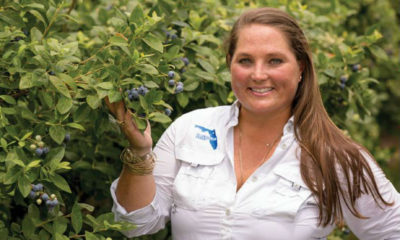As we embark upon a new year, the Florida Blueberry Growers Association Board wishes you, your family and your farm a prosperous 2020 season!
- Home
- About Us
- Hall of Fame
- UF/IFAS Blueberry Extension
- Blueberry Fans
- Grower
- Contact Us
As we embark upon a new year, the Florida Blueberry Growers Association Board wishes you, your family and your farm a prosperous 2020 season!
The holidays have come and gone, but two things remain the same—the season ahead will bring its own challenges and hopefully rewards, and The Blueberry News is here to help Florida growers like yourself prepare and spread the news about the latest and greatest news in the industry.
Check Out The Newly Released Pesticides and Application Advice
Blueberry Advisory System a Web Based Tool for Timing Anthracnose Fruit Rot Controls
Learn More About the Presentations Featured at FBGA’s Fall Meeting
According to the World Meteorological Organization (WMO) the global average temperature in 2019 (January to October) was about 2.0 degrees Fahrenheit (1.1 degrees Celsius) above the pre-industrial period. The year 2019 concludes a decade of exceptional global heat, retreating ice and record sea levels driven by greenhouse gases from human activities. Average temperatures for the five-year (2015-2019) and ten-year (2010-2019) periods are almost certain to be the highest on record. The National Oceanic and Atmospheric Administration (NOAA) also reports a positive trend for the contiguous U.S. annual average temperature (+0.15°F per decade) from 1895 to 2018.
UF Breeding Program Releases Colossus, a Highly Versatile Southern Highbush Blueberry
Innovators, Trailblazers Amid Blueberry Hall of Fame’s Inaugural Class
Surge in Mexican Blueberry Imports Stifling Florida’s Blueberry Profits
Brittany Lee Is Honored for Her Dedication, Tireless Advocacy for UF/IFAS
Positive Changes Strengthen Our Impact on the Industry
A notable win was being included in the recently signed disaster relief funds which retroactively applies to our Blueberry growers affected by Hurricane Irma. You will finally be able to apply for the much needed relief after suffering losses from the devastating storm.
Southern highbush blueberries (SHB) experience a significant amount of canopy growth during the summer months following post-harvest pruning. Most of the fruiting wood for next year’s crop is produced during the summer months. Careful irrigation and fertilization management is needed to ensure that the plants have sufficient water and nutrients to support this growth.
Florida producers continue to face major challenges as global production during the historical “Florida window” puts downward pressure on prices. As a land grant university, the University of Florida’s mission is to help Florida growers, nurseries, marketers, retailers, and ultimately Florida consumers.
The most important method of weed control is preventing current weeds in your field from developing seeds. Some common weed species in blueberry can produce more than 100,000 seeds per plant and can survive in the soil profile for 5 to 15 years. Preemergence herbicides can provide residual weed control for many weeks or months. But the frequent summer rainfall events may move the preemergence herbicide below the area of greatest control. So blueberry growers will rely on postemergence herbicides when they experience a reduction in weed control from preemergence herbicides.
Contact: Brittany H. Lee, President, Florida Blueberry Growers Association, 352-505-8878

Research on Most Effective Way to Keep Your Blueberries Hydrated
Florida blueberry growers produce more berries this year, despite pollination problems, gall midge and Hurricane Irma.